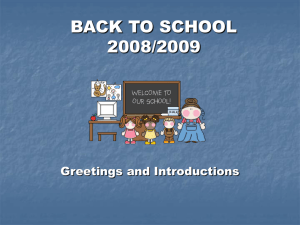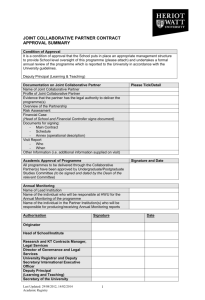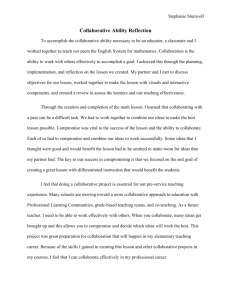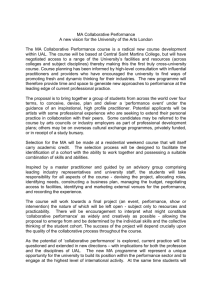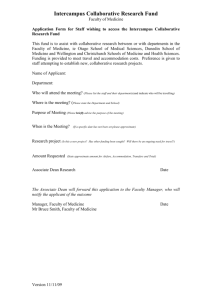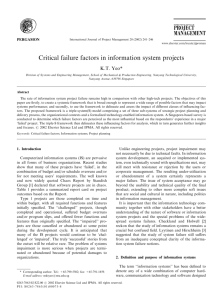Highly Collaborative Guide
advertisement
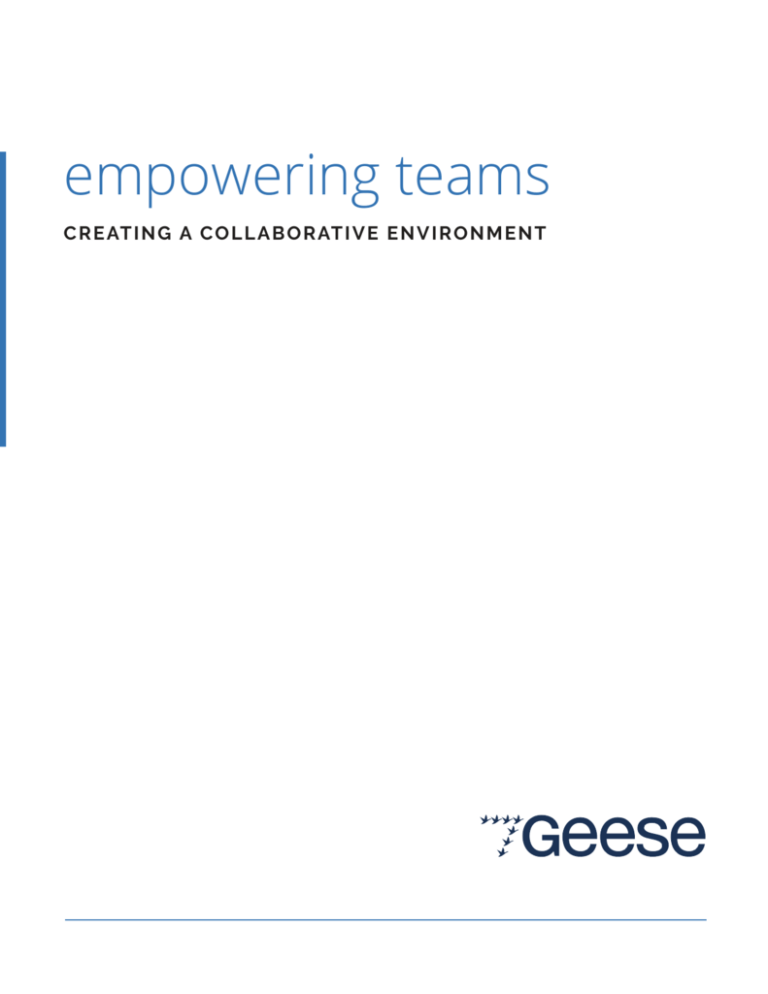
empowering teams C R E AT I N G A C O L L A B O RAT I V E E N V I R O N M E N T why collaboration, not just cooperation matters COLLABORATION, NOT JUST COOPERATION SIGNALS, “YOUR OPINION ACTIVELY MATTERS!” The biggest differentiator between collaboration and cooperation or teamwork is the element of vulnerability. When people feel trusted to voice their opinion they can innovate and inspire others. This spurs a collaborative atmosphere and culture. removing the "I only do this, not that," mentality, organizations can innovate, create, and inspire each other. They can leverage all skills in the team for the right reasons, not just because they have to. C O L L A B O RAT I O N E N C O U RAG ES A C U LT U R E O F T R U S T This causes team member’s full capabilities to come out. Without the fear of losing their job for speaking their opinion, individuals can focus on creating amazing solutions. Collaborative spaces also unify everyone under a shared purpose (same team mantra!). Collaboration breaks down silos of "jobs to get done" within teams and roles. By page 4 of 26 Chat with 7Geese hello@7geese.com misconceptions and realities of collaboration TO ENCOURAGE A COLLABORATIVE ATMOSPHERE YOU HAVE TO MOVE BEYOND JUST COOPERATING Having a meeting with multiple people talking about a project is collaboration. R E A L I T Y: Collaboration is a continuous and iterative process that goes beyond the scope of a meeting. Processes are created from outcome-based behaviours. Behaviours, otherwise known as habits, develop and grow over time. This creates a cycle where skills across teams can continuously be leveraged. One single contribution, one time, does not mean an environment is created where everyone has a voice andcan actively impact outcomes. Teams can't be collaborative as they have different measures of success. R E A L I T Y: Variety makes teams successful. Think of a strategic board game. In most page 4 of 26 strategic, puzzle based games at the start there are an infinite number of moves that can occur at any give time. Just because there's multiple strategies, doesn't mean you can't master the game. Collaboration means you’re continuously linking actions to patterns, encouraging identifiable scenario discussions, and welcoming differeing approaches. Collaboration is actually the same as cooperation, a synonym. R E A L I T Y: Cooperation is defined by individuals developing ideas in isolation, then sharing these ideas with others. Collaboration is defined by ideas created in unison with, collective agreement. Joint discussions lead to innovative, creative ways of thinking. Connecting various perspectives at all times keeps all interests in mind, at all times. Chat with 7Geese hello@7geese.com pt 1. bringing collaboration to your own team and organization 11 TIPS TO JUMPSTART A COLLABORATIVE TEAM BUILD A SENSE OF COMMUNITY L E A D BY E X A M P L E Employees need a personal connection to one another to trust each other. One way to create community is to establish core values and begin to publicly recognize behaviours that exhibit these values. Everyone is a leader no matter what age, what role, or what experiences they've had. There's an innate capacity for everyone to influence positive change. Leverage different points-of-view any opportunity you get. HOLD PRODUCTIVE MEETINGS L I S T E N TO YO U R T E A M ’ S N E E D S Good meetings have clear objectives and an agenda sent ahead of time. Productive meetings have purpose, accountability, and takeaways. Every time. We are always so adamant about listening to the voice of the customer or our mother. So be sure to also listen to the voice of those that are pivotal to the success business. The team. Listen to their ideas, what they need to succeed at their job, and their suggestions on improving internal processes. S T RAT EGY B E FO R E T EC H N O LO GY Before rushing to commit to software it's important to understand the strategy that will help you do the how. Initiatives don't succeed from using tools along,. Create a common understanding of how a new tool can help the strategy. D O N ’ T M I C R O - M A N AG E Respect employees and give them autonomy to do their jobs. Trust them. C O N T. O N N E X T PAG E page 4 of 26 Chat with 7Geese hello@7geese.com pt 2. bringing collaboration to your own team and organization 11 TIPS TO JUMPSTART A COLLABORATIVE TEAM D O N ’ T M A K E I T A B O U T B O N U S ES PERSISTENCE Collaboration isn't defined or related to compensation. Encouraging and motivating each other, even if there is good communication can be difficult if the only reason people are working together is for compensation. Without a constant, persistent attempt to connect with teams and engage everyone, collaboration won't work. This isn't to say great performance shouldn't be rewarded. A supportive environment means having resources and a culture of coaching available to encourage teamwork. M E AS U R E W H AT M AT T E R S M O S T Focus on metrics that tie back to your use case, not someone else's. Create realistic performance expectations that teams can measure up to. It's not about what someone else is doing, but what makes sense for your culture, team, and growth. page 4 of 26 L E A R N TO G E T O U T O F T H E WAY Don't stifle collaboration by not trusting the skill sets you've hired. Best practices, policies, and processes act as guidelines to let your hires know do what they need to do, but trust that they're bringing expertise to the team. You hired them because you needed help - let them help! A DA P T A N D E VO LV E AS YO U G R OW As new strategies, tools, and team members come and go, the workplace continues to grow as well. Keep a pulse on your culture, internal processes, and anticipate! This will help you innovate, not just copy others. Chat with 7Geese hello@7geese.com contact us 300-55 Water St. Vancouver, BC V6B 1A1 Canada hello@7geese.com +1.800.280.2967 +1.604.568.1296
